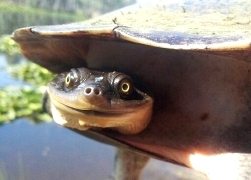23 May 2014
 A massive decline in turtle numbers in the River Murray – with populations down more than 90 per cent in some areas – has seen researchers turn to ‘citizen science’, or crowd sourcing, to gather data on these quiet environmental cleaners.
A massive decline in turtle numbers in the River Murray – with populations down more than 90 per cent in some areas – has seen researchers turn to ‘citizen science’, or crowd sourcing, to gather data on these quiet environmental cleaners.
Launched today on World Turtle Day, the new TurtleSAT app turns every smartphone into a sophisticated data logger, and every user into a field assistant in the biggest study of freshwater turtles ever undertaken in Australia.
It is hoped that input from the public will help build a clearer picture of the distribution of turtles in Australian waterways. These animals play an essential role in the aquatic ecosystem, helping maintain water health for plants and other organisms. Gathering data on where they are living will help guide efforts for protection and conservation.
Largely funded by the Field Naturalists Society of South Australia and the University of South Australia’s Barbara Hardy Institute, TurtleSAT is an easy-to-use, free mapping app for all smart phones and tablets. It is designed for quick data entry with picture guides to help users identify the turtle they have spotted, while the phone’s inbuilt GPS automatically records the location.
The data gathered are expected to reveal key areas such as nesting grounds or hazards, enabling simple and inexpensive interventions to keep predators away from nests or reduce the amount of road kill.
Barbara Hardy Institute Adjunct Professor Mike Thompson says the turtle population is in crisis.
“In the mid-1980s it was estimated there were at least 50 million turtles in the river. We’ve lost up to 45 million of those in the last 30 years,” he says.
The reason for this decline is unclear, with the drop in numbers exacerbated by recent drought. Non-native predators such as foxes are also playing a major role in threatening turtles.
“More than 90 per cent of turtle nests in South Australia’s Riverland are dug up by foxes,” Prof Thompson says.
“Foxes kill the mothers and eat the eggs, which has a huge, double-barrelled impact on the ability of the species to reproduce.”
But it’s not all bad news, he says.
“South Australia has a fabulous network of volunteer organisations, and we’ve found people along the river are particularly interested in the species’ survival,” Prof Thompson says.
“By firing up this free app, anybody and everybody can contribute to our research to help understand and protect turtles, which play such an important role in the overall river ecosystem.”
TurtleSAT is available now for Android, iPhone, iPad and Windows phone, and is coming soon for Windows 8.
Media contact: Kelly Stone office 8302 0963 mobile 0417 861 832 email Kelly.stone@unisa.edu.au


